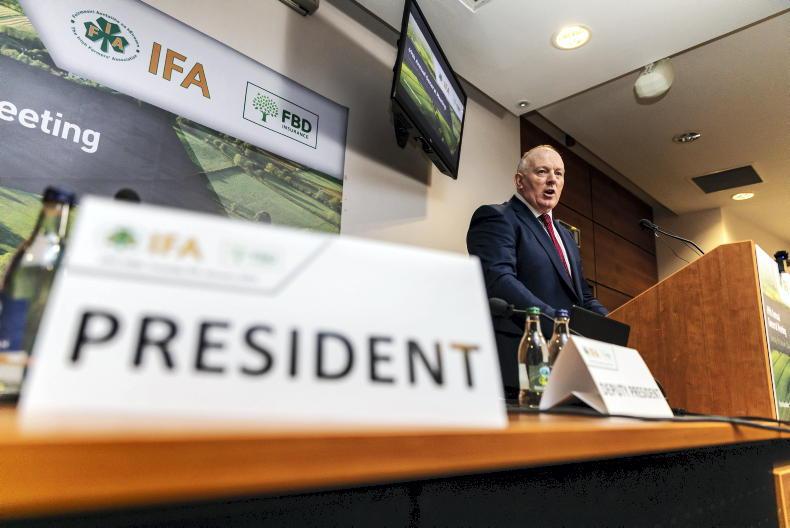Delayed payments and addressing changes to the Irish Cattle Breeding Federation (ICBF) indexes are two of the issues Francie Gorman plans to tackle in his first 100 days as IFA president.
“The whole payments debacle, it has been a disaster and a failure of this Government from the top down not to be able to deliver those payments to farmers on time.
“We’ve got to be able to have a look at the way the ICBF indexes are calculated, the effect it has on the Suckler Carbon Efficiency Programme (SCEP) and the breeding policies within the suckler herd,” he said.
Responding to a question from the Irish Farmers Journal after his address at the IFA AGM, the new IFA president said he plans to back ideas coming from the commodity committees.
Ownership
“The commodity chairs and committee members across the country are key in the organisation. I want to give them a sense of ownership of the organisation and the decisions we’re going to take,” he said.

Francie Gorman took up his role as the 17th IFA president at the organisation's AGM. \ Philip Doyle
Gorman added that other big-ticket items for him will be the environment and anything that has an impact on farmers’ profit margins.
“The big issues are around everything environmental and CAP. Things that have a big impact on farmer margins and the cost of doing business,” he said.
However, Gorman also said he feels the most important thing for him is to tackle the first issue that comes across his desk “in the most proactive way possible”.
Deputy president
Alice Doyle outlined three immediate issues she wants to address as deputy president: creating policy that makes farming viable, ensuring farming is an attractive industry for young people and promoting a positive narrative around farming.
“The first thing is, I would like to work with the committee and the group I have now been elected to, under the new president, to create policy that makes farming a viable prospect for farmers and to work with them to ensure they are economically and environmentally sustainable going forward.
“The second one is, I want to make sure farming is seen as a positive industry which you can bring young people into; that young people will come into farming and see it as a positive place to be, then we will see more members in our organisation.
“Thirdly, I think the whole narrative around farming has to change. We are going to have to preach the positivity of how good farmers are. Farmers are good workers, it is a very noble profession, they are out there doing their best every, single day. They are the frontline workers in the whole area of climate change and they need to be given credit for that,” she said.
Delayed payments and addressing changes to the Irish Cattle Breeding Federation (ICBF) indexes are two of the issues Francie Gorman plans to tackle in his first 100 days as IFA president.
“The whole payments debacle, it has been a disaster and a failure of this Government from the top down not to be able to deliver those payments to farmers on time.
“We’ve got to be able to have a look at the way the ICBF indexes are calculated, the effect it has on the Suckler Carbon Efficiency Programme (SCEP) and the breeding policies within the suckler herd,” he said.
Responding to a question from the Irish Farmers Journal after his address at the IFA AGM, the new IFA president said he plans to back ideas coming from the commodity committees.
Ownership
“The commodity chairs and committee members across the country are key in the organisation. I want to give them a sense of ownership of the organisation and the decisions we’re going to take,” he said.

Francie Gorman took up his role as the 17th IFA president at the organisation's AGM. \ Philip Doyle
Gorman added that other big-ticket items for him will be the environment and anything that has an impact on farmers’ profit margins.
“The big issues are around everything environmental and CAP. Things that have a big impact on farmer margins and the cost of doing business,” he said.
However, Gorman also said he feels the most important thing for him is to tackle the first issue that comes across his desk “in the most proactive way possible”.
Deputy president
Alice Doyle outlined three immediate issues she wants to address as deputy president: creating policy that makes farming viable, ensuring farming is an attractive industry for young people and promoting a positive narrative around farming.
“The first thing is, I would like to work with the committee and the group I have now been elected to, under the new president, to create policy that makes farming a viable prospect for farmers and to work with them to ensure they are economically and environmentally sustainable going forward.
“The second one is, I want to make sure farming is seen as a positive industry which you can bring young people into; that young people will come into farming and see it as a positive place to be, then we will see more members in our organisation.
“Thirdly, I think the whole narrative around farming has to change. We are going to have to preach the positivity of how good farmers are. Farmers are good workers, it is a very noble profession, they are out there doing their best every, single day. They are the frontline workers in the whole area of climate change and they need to be given credit for that,” she said.







 This is a subscriber-only article
This is a subscriber-only article











SHARING OPTIONS: